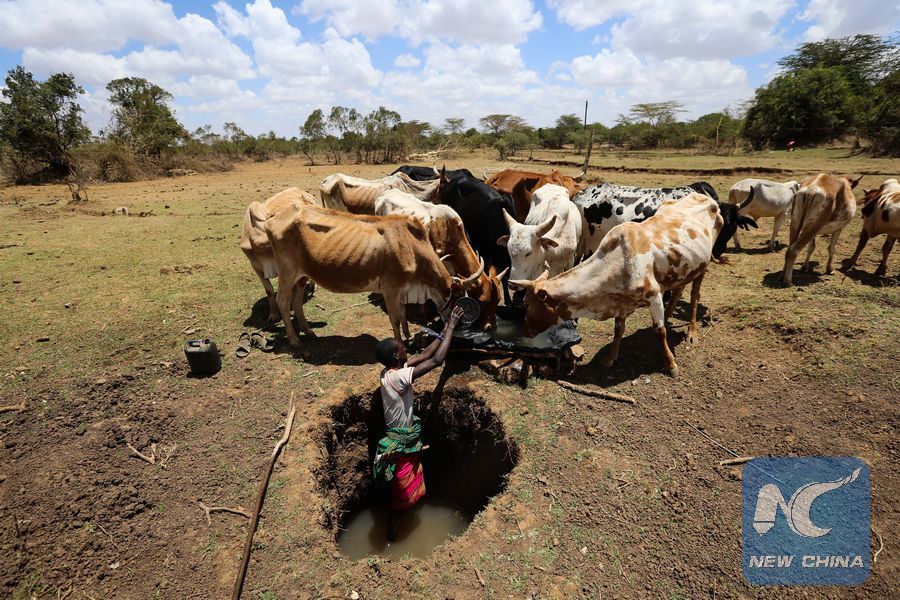
A herder stands in a water pool to collect water for his cattle in the drought-hit Laikipia County, Kenya, on March 1, 2017. (Xinhua/Pan Siwei)
NAIROBI, Feb. 20 (Xinhua) -- Several towns across Kenya, including the capital Nairobi, are facing an acute water shortage following a prolonged dry spell in the East African nation.
While Kenya has been facing water supply challenges, especially in Nairobi, where residents for years have had water rationed, the dry spell has worsened the situation as the crisis spread to towns that never had the problem.
Affected towns include Nairobi, Nakuru, Kakamega, Mombasa, Kericho, Migori, Bungoma, Murang'a and Eldoret.
Some of the residents in the towns have not received water through their taps for months, and resort to buying from vendors at exorbitant prices.
Most parts of Kenya last received rains in October 2017, and this followed an erratic rainy season between March and May in that year, according to the Meteorological Department.
The East African nation has experienced the erratic rains for the past three years due to the effects of climate change that have not only affected water supply but also food production.
"The last time I received water through my tap was six month ago," John Kuloba, a resident of Donholm on the east of Nairobi said Monday. "I have been buying water from vendors for domestic use and it is really expensive," he added.
Kuloba said the Nairobi water company released a schedule and his area is supposed to be getting water every Saturday.
"But this has never happened in the larger Donholm. Some areas located on the lower part get water but not us. I buy 20 litres of water at 0.30 dollars, which is expensive considering that I have a family of four," he said.
Moses Mwangi, a resident of Kahawa in Nairobi, shared the same predicament, noting that he is spending huge sums of money on water.
"A 20-litre container is being sold at between 0.20 dollars and 0.50 dollars. The price goes up at the weekend when demand rises since most people are usually at home. This is a huge crisis that we pray for the rains to come soon," he said.
Athi Water Services Board, which manages water resources in various urban areas, notes 75 percent of Nairobi residents do not get regular supply of piped water.
Kakamega town, one of the regions where residents never had water shortage, is currently gripped in a major water crisis, with residents going for weeks without the crucial commodity.
The level of water in Isiukhu, a major river where water is tapped and treated before it is supplied to the over 30,000 residents ,has hit an all-time low.
"For the first time since I started staying in Kakamega some 20 years ago, we receive water once a week, and it only comes for a few hours. For the rest of the weeks, we have to buy the commodity where a 20 litre can is being sold at 0.20 dollars," said Doris Injendi, a resident.
The crisis is compounded by the fact that several rivers where a majority of residents used to turn to for their water supply have dried.
"We used to draw water from a nearby river but it dried last year in November, and it is not only here, even in other places in the county, streams have dried," she said.
In Nakuru, Kericho and Mombasa, residents are buying 20 litres of water at an average of 0.30 dollars as the crisis bites.
"Water is scarce in Nakuru and the surrounding areas. You have to buy at a high price from vendors who are doing a booming business yet you are not even assured of the quality and the source," said resident Steven Kamau on Monday.
In Murang'a, the main source of water for Nairobi, taps have run dry for the last two weeks as rivers too dry up. Residents said it is the first time rivers have dried and they have faced a water crisis in their adult lives.
Analysts have blamed the water crisis on climate change that has seen rains disappear, destruction of forests, poor management of the resource and a bulging population.
"Kenya has brought this problem on itself because little has been done to protect forests and other water catchment areas. Destruction of forests is going on unabated even as the country faces a major crisis. We cannot destroy forests and expect rains," said Henry Wandera, an economics lecturer.
Wandera noted that regions like Murang'a and Kericho, which host many rivers and forests never used to suffer water shortages, but the fact that they have been hit shows how dire the situation is.
James ole Kiyiapi, a professor of environment and former principal secretary in the government, blamed the water shortage on destruction of forests, including the Mau, the biggest water catchment area in Kenya.
Kiyiapi noted that Kenya is a water scarce country, therefore the government must integrate water and forestry policies.
"We can only have water on our taps if we engage in massive reforestation and afforestation in mountain and hill areas at county and national levels. We should take the re-greening Kenya agenda to a new level, allocate funds for about 10-20 years for positive results," he noted on his Twitter handle, where the issue has been a hot debate in the last two weeks.
Kenyans on social media were unanimous that the East African nation is caught in the current predicament due to politicization of environment and water conservation efforts.
"If you fly over the Mau Forest, you will be shocked by the wanton destruction yet you cannot evict people doing the mess because you will face a political backlash. The government must stand up and act," said David Mugoli on Twitter.

